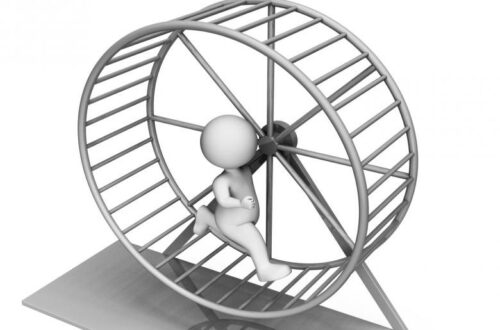
Is autonomy a myth? (Spoiler: No it is not.)
Are humans autonomous beings or is autonomy a myth? In the debate on this question, two views are often diametrically opposed: on the one hand there are people who believe that everyone is autonomous or should at least strive to be, and on the other, those who believe that people are not autonomous at all and also cannot be.
They are two seemingly irreconcilable visions of the nature of man. As so often, the alleged incompatibility is the result of a lack of clarity about what exactly we mean when we talk about a concept like autonomy. After all, without a good understanding of what autonomy is – and what it is not – we will be having different conversations.
So the question is: what exactly do we mean when we talk about autonomy? Autonomy is derived from the Greek words ‘auto’ (self) and ‘nomos’ (law) and means something like ‘according to your own law’. Living autonomously means living according to your own rules. No, you shouldn’t take that literally; autonomy does not mean that you no longer have to take rules into account and can do whatever you want. Let me try to clarify.
British philosopher Isaiah Berlin sees the pursuit of autonomy as a result of “the individual’s desire to be master of himself.” Autonomy is therefore closely related to self-determination: the freedom to decide independently and at your own discretion about how you want to live your own life. Berlin calls this positive freedom: “I want my life and my decisions to depend on myself, not any outside forces.”
It is the latter aspect that has met with criticism from those who believe that people are not and cannot be autonomous. No one can live his life completely free and independent of any outside influence, because we are constantly influenced by all kinds of factors (circumstances, other people). Humans are social beings, embedded in society and networks of relationships with others.
Those critics are of course right about that. No one is completely independent. Nobody lives in a vacuum, completely isolated and on their own. We always relate to our environment, both to our physical living environment and to the people around us and we are also dependent on that.
We depend on our natural environment: from the oxygen we breathe and the light of the sun to the food we eat and the water we drink. We depend on other people: from those who provide for our necessities (the farmer, the baker, the doctor) to the people who help and support us (family, friends). We depend on our circumstances: the place where we were born, the environment in which we grew up, and the traits and skills we have. And in our modern society we depend on the structures we are part of (democratic institutions, the company where we work) and the laws, rules and customs that guide our behavior.
And we cannot freely decide on some of those circumstances and dependencies. Sure, you can decide to move to a different environment, with different people and different circumstances. And you can decide to look for another job or learn a new skill. Those decisions – which you can make in freedom – may change your circumstances and dependencies, but not your dependence as such. Rather, the examples confirm that all your choices, all your actions, happen in the context of your environment and dependencies.
That dependence is inherent to human existence. Why then say that humans are autonomous? If people are by definition dependent on environmental factors, isn’t autonomy indeed a myth? The answer is no. We are autonomous beings because we are free to determine how we relate to our environment and circumstances.
Circumstances and dependencies mean constraints, preconditions, boundaries. But within those you have a lot of room to choose for yourself, to determine for yourself what your life looks like. It is inherent to making choices that those choices are made in a context. “A prerequisite for a choice”, says the German philosopher Wilhelm Schmid, “is that you take into account that it is limited by structural circumstances and that you do not situate it in empty space.”
Autonomy thus takes shape in the context of circumstances and dependencies. This may mean, for example, that you want something that is not feasible in the given circumstances. Or that your beliefs in some area have been influenced by what you have learned from others. But that does not mean that you are not autonomous. Autonomy is not absolute. Isaiah Berlin points out that freedom is never absolute: “Everything I do inevitably affects or is affected by what others do.”
Autonomy is the freedom – within the framework of your circumstances – to decide independently and at your own discretion about how you want to live your own life.
The Swiss philosopher Peter Bieri describes two aspects of autonomy. The first is the external aspect, namely: leeway. The room to relate to your environment. The second is the internal aspect: The room to be who you want to be in terms of “thinking, experiencing and wanting”. That room, that autonomy, is an inherent aspect of human existence.
This idea is at the heart of existentialism. According to French philosopher Jean-Paul Sartre “man is free” to choose who he wants to be. This autonomy means that “man is nothing other than his own project,” according to Sartre, “he is nothing more than the sum of his actions.” We are responsible for shaping our own lives. Existentialism, Sartre says, “defines man by his actions” and “man’s destiny lies within himself.”
This is the essence of autonomy, the freedom to choose how we use the leeway that we have and thus shape our lives. And, says Sartre, there is no way around that. We always have room to choose. “It is impossible not to choose,” according to Sartre. Given your circumstances, you choose. And by doing so, you choose who you will be. That is autonomy.
Faced with what comes your way, given the circumstances, the question is always: How do you relate to it? Do you accept it? Or do you consciously choose your own course? The compass we can use to navigate in determining that course, how we want to relate to our environment and dependencies, are our own personal values, ideas, beliefs and wishes.
British philosopher John Stuart Mill points out that this is precisely where our freedom is located: In “the world of inner consciousness.” If there is one area in which we are autonomous, according to Mill, it is our “freedom of thought and feeling, absolute freedom of opinion and disposition on all subjects, practical or speculative, scientific, moral or theological.”
Like we do not act in a vacuum, our ideas do not arise in a vacuum. We depend on – and are influenced by – the ideas and opinions of others, what we hear or read, and the dominant norms and values in society. Our ideas also do not come about completely independently and free from influences. But again, that doesn’t mean we aren’t autonomous.
People who are against seeing humans as autonomous beings see it not only as contrary to human nature (because they mistakenly assume that autonomy means total independence while humans are social beings), but also as undesirable. Undesirable because it would lead to a society of atomic individuals living alongside each other.
This idea is reflected for example by Dutch philosopher Joep Dohmen. He links the “myth of autonomy” to the “neo-liberal zeitgeist” that has ensured that “self-determination and non-interference” have become kind of sacrosanct. According to Dohmen, this has led to a society in which everyone has to save themselves, which encourages selfishness and narcissism. But this negative image has little to do with what autonomy is about.
The pursuit of autonomy stems, as Isaiah Berlin puts it, from the desire to be recognized as a “thinking, willing, acting being, who bears responsibility for his choices and is able to explain them on the basis of his own ideas and intentions.” Autonomy is therefore about human dignity. It is for a reason that the Austrian psychiatrist Viktor Frankl, who has experienced what it is like to be stripped of your human dignity, states: “Everything can be taken from a man but one thing: the last of the human freedoms – to choose one’s attitude in any given set of circumstances, to choose one’s own way. ”
Autonomy is therefore the freedom – within the framework of your circumstances – to decide independently and at your own discretion about how you want to live your own life. Live ‘auto nomos’ – according to your own rules. Or as Peter Bieri puts it: “Our life is autonomous if we manage to live it both internally and outwardly in accordance with our self-image, if we succeed in acting, thinking, feeling and wanting to be who we would like to be. ”




